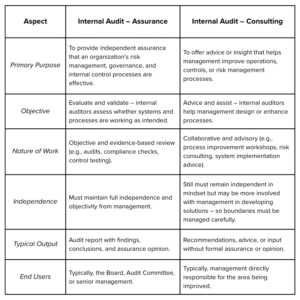What Is Internal Audit Consulting?
Key Takeaways
- Advisory-Focused Support: Internal audit consulting provides guidance – not assurance – to help organizations strengthen processes, controls, and overall operations.
- Filling Internal Gaps: Consultants offer a flexible solution for organizations without in-house audit functions, especially smaller entities needing support across risk, IT, and operational areas.
- Broad Expertise Areas: Key consulting strengths include cybersecurity advisory, privacy risk management, control design and optimization, governance and ethics program evaluation, and risk assessment facilitation.
- Clear Role Distinctions: Internal audit consulting differs from assurance work in purpose, independence, collaboration level, and output, focusing on improvement rather than formal opinions.
- Strengthening Organizational Resilience: Independent, knowledgeable consultants help organizations enhance controls, meet compliance requirements, and proactively manage emerging risks.
Internal audit consulting refers to advisory services that help organizations improve processes, controls, and overall performance. It involves advice and assistance rather than providing assurance of processes and controls. The Institute of Internal Auditors (IIA) defines consulting services as “advisory and related client service activities, the nature and scope of which are agreed to with the client, intended to add value, and improve an organization’s operations.”
While many larger organizations have an internal function to provide ongoing assessments of controls, compliance, and efficiency, smaller organizations often do not. Internal audit consulting provides an option for organizations that may not have an internal audit department but are looking to improve their processes, risk management, financial information technology, and operational controls. The following are key areas where internal audit consultants can help organizations meet their objectives.
Cybersecurity Advisory
Many organizations lack the bandwidth to keep up with the ever-changing cybersecurity landscape. Bringing in individuals from outside of the organization who are both knowledgeable of the landscape and aware of the context that the organization is functioning within can help strengthen the organization’s ability to respond to this dynamic landscape. Some key areas that internal audit consultants can help with are control design and evaluation, risk identification and assessment, incident response procedures and testing, governance and oversight, along with other operational and organizational practices.
Privacy Risk Management
Internal audit consultants can help an organization with privacy risk management by assessing compliance with privacy regulations and laws, reviewing personal data collection and retention processes, and evaluating existing privacy controls. They can play a key role in these areas by providing an independent and knowledgeable review of the organization’s privacy processes and potential risks.
Control Design and Optimization
The role of internal audit consultants as it relates to control design and optimization could pertain to the creation and implementation of a control environment for key business processes. The other role internal audit consultants can play relates to an evaluation of the current controls in place. This can be accomplished based on a certain framework or business objectives defined by management. It can also be completed in relation to meet external requirements such as Sarbanes Oxley (SOX). Internal controls are vital for organizations and the ability to have an independent, objective, and consultative evaluation of those controls is key to a growing organization.
Governance and Ethics Programs
Having a defined and effective ethics program driven by those in leadership not only helps employee performance, but it also can lead to organization wide success. Internal audit consultants can provide independent and objective evaluations of an organization’s governance practices and evaluate how that is contributing to an ethically healthy organization. The independent auditors can recommend improvements to ethics policies and procedures in place, identify gaps or weaknesses, and assess conformance with regulatory and legal requirements. Specific examples could be the development of whistleblower programs, ethics training, or board reporting structures.
Risk Assessment Facilitation
Due to limited resources, organizations may be unable to properly identify and assess both internal and external risks. Bringing in outside resources that are both experienced and knowledgeable of the industry and the external risks can help organizations assess, prioritize, and remediate risks.
Internal Audit Assurance vs. Consulting
The key distinctions between internal audit assurance and consulting lies in their objectives, level of independence, and intended outcomes.
Here is a clear comparison between the two:

Internal audit consultants can play a key role in the success of an organization. Not having an in-house internal audit department does not mean an organization is without options.
To learn more about McKonly & Asbury’s Internal Audit services, contact Dave Hammarberg, Partner, or Victor Kong, Senior Manager, who have been providing internal audit services for over twenty years. We would love to discuss how we can assist you with your challenges.
About the Author

Jordan Crews joined McKonly & Asbury in 2022 and is currently a Supervisor with the firm’s Advisory Segment.



